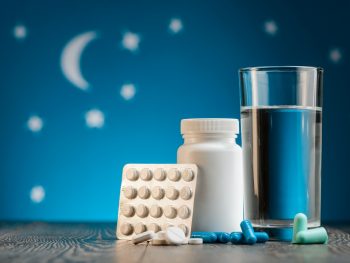If you have sleep apnea, your breath is interrupted while you are asleep. This interruption can be from seconds up to a minute long and can be dangerous. One of the most common phenomena of sleep apnea is Obstructive Sleep Apnea also known as OSA in which the breathing airway is blocked despite your efforts to breathe.
This disorder usually occurs when the tissue at the back of the throat collapses which can lead to the blockage of the air that should reach your lungs. There is another type which is called Central Sleep Apnea (CSA).
In this type, the function of the brain is not active enough to signal the muscle responsible for breathing. This can then cause interruptions in your night breathing.
Sleep apnea symptoms
People suffering from sleep apnea disorder feel tired and moody because of the interruptions in their breathing and waking up again and again during the night. This disorder is common among males, especially who are overweight or have any family history. Recognizing the symptoms timely is very important for taking actions regarding its treatment. Almost 1 in 5 adults suffer from this disorder. There are many causes of this condition which include muscular changes, routine changes, stress, overweight, and smoking, etc.
When sleeping alone, it may be a bit difficult for you to know whether you have sleep apnea or not. But, there are some symptoms which we have discussed below to help you know if you are suffering from this disorder.
SNORING
Snoring is the most common symptom of this disorder. People suffering from OSA snore loudly. This loud noise is caused due to vibrations of the upper airways. Many people who snore at night may not be aware of this and are usually told by their annoyed bed partner or anyone sleeping near them.
Small and low snores are not a sign of danger. But if you snore wildly and loudly, then this may be an indication of this disorder and you need to consult with your physician. If you sleep alone and you are doubtful whether you snore or not, all you can do is to take a voice recorder and record. This will help you to know how loudly you snore and then you can take steps for your treatment.
FEELING EXHAUSTED
Another sign of this disorder among both men and women is feeling exhausted and fatigue the next day. This happens because you wake up frequently at night due to blockage of breath. This prevents you from getting proper sleep and thus your brain does not get refreshed.
You may have plenty of hours for sleeping, but pauses and interruptions can disrupt your peaceful sleep. This results in Excessive Daytime Sleepiness (EDS) which includes lack of energy during daytime, sleepiness, tiredness, fatigue, and drowsiness all day long. You keep on taking tea and coffee which increases the caffeine level in your body thereby leading to other diseases like high blood pressure, heart attacks and irritation. So, if you feel that you have any of these feelings, ask your doctor about the medications for the timely treatment.
GASPING/CHOKING
Fighting to breathe while you are sleeping causes choking. It is a condition in which you struggle to breathe as your respiratory airway is blocked. It can be really disruptive for you and reduces your sleeping hours. Gasping and choking can reduce the oxygen level in your blood which causes your brain to wake up during the night. This occurs commonly with the people who sleep at their back.
You may not always be aware of this choking condition because the interval may be short and that is something dangerous especially if you are alone and there is no one to tell you about your night choking. However, some intervals may be long and wake you up during nights. Upon having any experience like this, consult any cardiologist or your doctor so you may be treated properly.
- Don’t miss: How Much Sleep Do I Really Need
MORNING HEADACHES
Apnea disorder causes degradation in the level of oxygen in the body because you breathe less at nights and less oxygen is delivered to your brain. This causes blood vessels to dilate which results in a headache. People who suffer from this disorder also reported their frequent morning headaches. Also, this is because they may be unaware of other symptoms which goes unnoticed as they are asleep. This symptom is helpful when nobody sleeps with you.
- Suggest reading: How to fall asleep fast
HIGH BLOOD PRESSURE
Sleep apnea disorder puts pressure on your heart, brain and whole body during the night. Lack of sleep and rest is directly related to high blood pressure. When the body does not get enough oxygen for its functioning due to blockage of airways, it results in high blood pressure. Your blood vessels do not function properly in this scenario.
Your body gets accustomed to high blood pressure when this happens repeatedly. So, you always need to check your blood pressure regularly to avoid further any serious health issue. Also, try to consult your doctor weekly if you have any problem with high blood pressure.
AWAKENING WITH A DRY MOUTH
This is a significant symptom of apnea disorder as you alone can feel it as well. Waking up with a dry mouth may be due to several other reasons which include dehydration, medications, age or tobacco along with the blockage of your respiratory airways which results in apnea disorder. Not getting enough oxygen or sleeping with an open mouth causes dry mouth. There are various ways to avoid this but if the condition prevails, timely consultation with your doctor is advised.
FREQUENT URINATION DURING THE NIGHT
Researchers have shown that getting up frequently at night to urinate is another indication that you might have apnea disorder. People suffering from this disorder needs to wake up 6 to 7 times to alleviate. Urination causes disruption in circadian rhythm which is related to your sleeping patterns. Almost 84% people with this disorder have also reported their frequent urination problem during night times.
Sleep apnea test at home
If you think you might be suffering from this disorder and have not visited your physician yet, there are some questionnaires online and small tests which can help you evaluate that. They ask you a certain type of questions like:
- Do you wake up tired or sleepy next day?
- Are you overweight? (Obese and over weighing are directly related to this)
- Does your bed partner complain about your snoring?
- Is your blood pressure high?
- Do you frequently wake up at night?
- Do you feel your mouth dry when waking up?
- Suggest reading: What Caused Snoring And How to Stop It
Answering “yes” to most of the questions may indicate that you have this disorder. However, this may not always be the case as these can be a mere problem themselves not an indication or confirmation of any disorder.
WRAP UP
The above-mentioned symptoms are only an indication to help you know that you might have sleep apnea. However, not all the people who snore, feel lazy or wake up at night suffer from this disorder. There are other causes as well as night sweats or insomnia. Different treatment and medication options exist for the treatment of this disorder. Also, there are different lifestyle changes which a person can maintain to reduce its danger. Losing weight, quitting smoking and caffeine, exercising regularly, avoiding sleeping on the back and maintaining regular sleep hours are some of the healthy habits you can adopt.
For the treatment, reference BIPAP vs. CPAP
Consulting your doctor on time and taking timely medications becomes important when you feel any of the above symptoms. Dental devices like mouthpieces, masks or surgeries are the treatments for this disorder. However, the mild condition can be treated with other less extreme options.







Leave a Reply